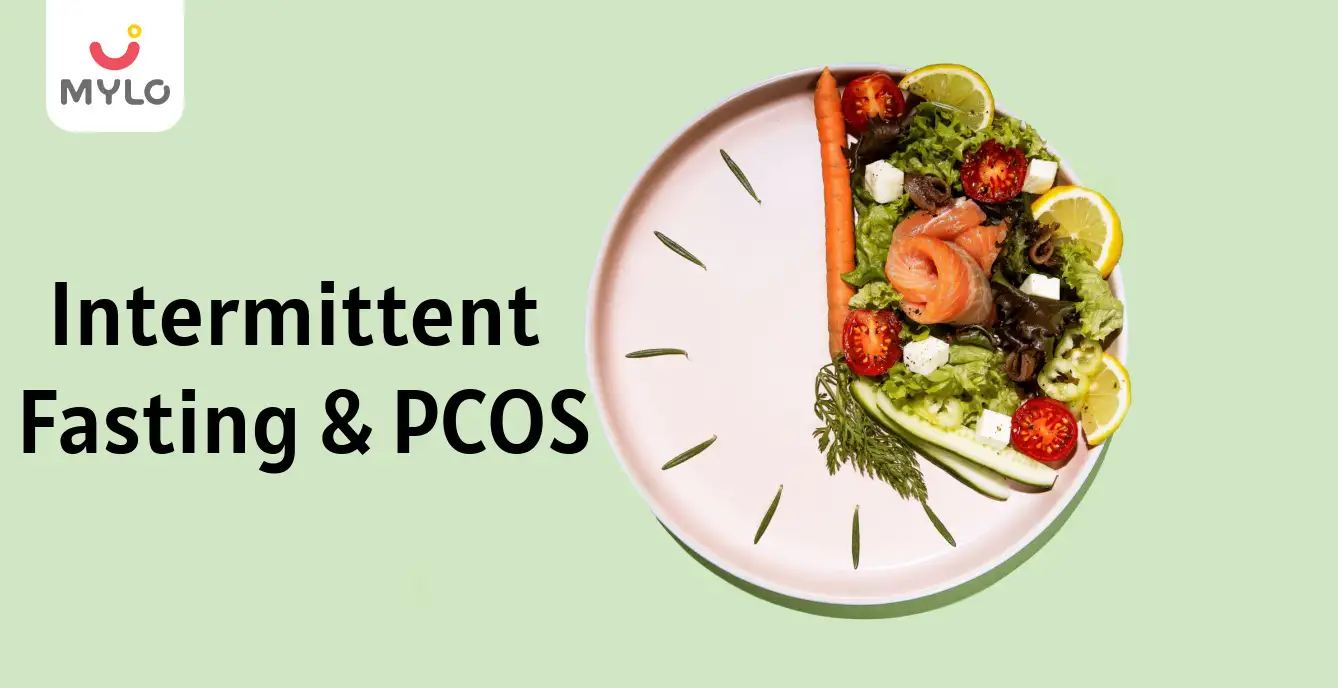- Home

- PCOS Mood Swings: The Ultimate Guide to Causes and Strategies for Relief
In this Article
Getting Pregnant
PCOS Mood Swings: The Ultimate Guide to Causes and Strategies for Relief
Updated on 21 December 2023



Medically Reviewed by
Dr. Shruti Tanwar
C-section & gynae problems - MBBS| MS (OBS & Gynae)
View Profile

Irregular periods and hormonal imbalances are hallmark symptoms of Polycystic Ovary Syndrome but a symptom that often goes unnoticed is PCOS mood swings. Women with PCOS may experience sudden mood changes, irritability and even depression but the severity of these symptoms can vary from person to person. Consequently, it becomes important to understand the relationship between PCOS and mood swings.
In this article, we will understand does PCOS cause mood swings, the relationship between the two and effective ways to manage mood swings due to PCOS.
Is it normal to experience mood swings in PCOS?
Mood swings are a common complaint among women with PCOS, but is it normal to experience them? Women with PCOS often experience hormonal imbalances, including elevated levels of androgens such as testosterone. These imbalances can lead to mood swings, irritability, and even depression.
It is important to note that not all women with PCOS will experience mood swings, and the severity of these symptoms can vary from person to person. However, if you are experiencing frequent and intense mood swings, it is essential to address them and seek support.
What is the relation between PCOS and mood swings?
The exact relationship between PCOS and mood changes is not yet fully understood. However, researchers have identified several factors that contribute to this connection. Firstly, hormonal imbalances play a significant role. Elevated levels of androgens can affect neurotransmitters in the brain, such as serotonin, which is responsible for regulating mood. Additionally, insulin resistance, a common characteristic of PCOS, can also impact mood stability.
Apart from hormonal factors, the emotional toll of living with PCOS can contribute to mood swings. Dealing with the physical symptoms, fertility challenges, and the uncertainty surrounding the condition can lead to anxiety, stress, and depression, all of which can exacerbate mood swings. It is important to recognize that PCOS is not just a physical condition but also has a significant impact on mental health.
What are the causes behind PCOS mood swings?
Here are five common factors that contribute to mood swings in women with PCOS:
1. Hormonal Imbalances
As mentioned earlier, elevated levels of androgens and imbalances in other hormones can disrupt the delicate balance of neurotransmitters in the brain, leading to mood swings.
2. Insulin Resistance
Insulin resistance, a hallmark of PCOS, can affect blood sugar levels and contribute to mood fluctuations. Unstable blood sugar levels can cause irritability and mood swings.
3. Sleep Disturbances
Many women with PCOS also experience sleep disturbances, such as insomnia or sleep apnea. Lack of quality sleep can impact mood stability and exacerbate mood swings.
4. Inflammation
PCOS is associated with chronic low-grade inflammation in the body. Inflammation can affect the brain and lead to mood disturbances.
5. Psychological Factors
Living with a chronic condition like PCOS can take an emotional toll. Stress, anxiety, and depression can all contribute to mood swings.
Effective strategies for managing mood swings in PCOS
While mood swings due to PCOS can be challenging to deal with, there are several strategies that can help alleviate symptoms and improve emotional well-being including:
1. Balanced Diet
A healthy, balanced diet that focuses on whole foods can help stabilize blood sugar levels, reduce inflammation, and support hormonal balance, which can in turn alleviate mood swings.
2. Regular Exercise
Engaging in regular physical activity can help reduce stress, improve mood, and promote better sleep, all of which can contribute to managing mood swings.
3. Stress Management
Learning effective stress management techniques, such as mindfulness meditation, deep breathing exercises, or engaging in hobbies, can help reduce the impact of stress on mood swings.
4. Adequate Sleep
Prioritizing quality sleep is crucial for managing mood swings. Establishing a bedtime routine, creating a sleep-friendly environment, and avoiding electronics before bed can promote better sleep.
5. Support Network
Building a strong support network of friends, family, or joining support groups can provide a safe space to share experiences and seek guidance, ultimately reducing the emotional burden of PCOS.
6. Medication
In some cases, medication may be necessary to manage severe mood swings. Consulting with a healthcare professional can help determine if medication is an appropriate option for you.
You may also like: PCOS Exercise: Your Guide to Sweating Away PCOS
Final Thoughts
PCOS mood swings can be distressing and impact a woman's overall quality of life. Understanding the causes behind these mood swings and implementing effective strategies for relief is crucial. By addressing hormonal imbalances, managing stress, and seeking support, women with PCOS can find relief from mood swings and improve their emotional well-being. Remember, you are not alone in this journey, and there is support available to help you navigate the challenges of PCOS.
References
1. Podfigurna-Stopa A, Luisi S, Regini C, Katulski K, Centini G, Meczekalski B, Petraglia F. (2015). Mood disorders and quality of life in polycystic ovary syndrome. Gynecol Endocrinol.
2. Chaudhari AP, Mazumdar K, Mehta PD. (2018). Anxiety, Depression, and Quality of Life in Women with Polycystic Ovarian Syndrome. Indian J Psychol Med.





Medically Reviewed by
Dr. Shruti Tanwar
C-section & gynae problems - MBBS| MS (OBS & Gynae)
View Profile


Written by
Anupama Chadha
Anupama Chadha, born and raised in Delhi is a content writer who has written extensively for industries such as HR, Healthcare, Finance, Retail and Tech.
Read MoreGet baby's diet chart, and growth tips

Related Articles
How Respiratory Syncytial Virus (RSV) Impacts Premature Babies Differently: What Every Parent Needs To Know
Adverbs: A Comprehensive Guide to help small children learn the usage of adverbs
Expand Your Child's Vocabulary with words that start with X: Easy, Positive, and Engaging Words, Animals, Countries, and Fruits
Unlocking Language Proficiency: The Ultimate Guide to Top 100 Sight Words for Kindergarten and Beyond
Related Questions
Influenza and boostrix injection kisiko laga hai kya 8 month pregnancy me and q lagta hai ye plz reply me

Hai.... My last period was in feb 24. I tested in 40 th day morning 3:30 .. That is faint line .. I conculed mylo thz app also.... And I asked tha dr wait for 3 to 5 days ... Im also waiting ... Then I test today 4:15 test is sooooo faint ... And I feel in ma body no pregnancy symptoms. What can I do .

Baby kicks KB Marta hai Plz tell mi

PCOD kya hota hai

How to detect pcos

Related Topics
RECENTLY PUBLISHED ARTICLES
our most recent articles

PCOS & PCOD
PCOS and Thyroid: Understanding the Complex Relationship and Finding Solutions

PCOS & PCOD
Intermittent Fasting & PCOS: The Ultimate Guide to Benefits, Risks and Precautions

PCOS & PCOD
Insulin Resistance & PCOS: A Comprehensive Guide to Causes and Management

Breathlessness
Your heart stops beating when your baby feels breathless! Here are 5 things to know about infant breathlessness.

Care for Baby
Newborn Crying: What It Means and How to Handle It?

Growth & Development
When Do Babies Make Eye Contact: Keeping an Eye on Important Milestones
- Is your baby getting breathless frequently? Five things you must know
- 50 Budget-Friendly Birthday Return Gift Ideas to Wow Your Guests
- PCOS Exercise: Your Guide to Sweating Away PCOS
- PCOS and Pregnancy: How to Manage PCOS on the Path to Parenthood
- PCOS Tests: The Power of Diagnostic Tests in Your Health Journey
- Must-Read Ruskin Bond Short Stories for Little Minds
- The Top 10 Tenali Raman Stories You Must Read to Your Kids
- Ovulation Bleeding: The Ultimate Guide to Causes, Symptoms and Management
- A Guide to Recognizing Symptoms of Ovulation After HCG Injection
- Bulky Ovaries Explained: What Every Woman Should Be Aware Of
- Ovulation: The Key to Maximizing Your Chances of Conception and Pregnancy
- The Ultimate Compilation of Fancy Dress Ideas for Young Kids
- How Long Does Sperm Take to Reach the Egg?
- Pregnancy Symptoms After Ovulation Day by Day: Exploring the Daily Progression


AWARDS AND RECOGNITION
Mylo wins Forbes D2C Disruptor award
Mylo wins The Economic Times Promising Brands 2022
AS SEEN IN
















At Mylo, we help young parents raise happy and healthy families with our innovative new-age solutions:
- Mylo Care: Effective and science-backed personal care and wellness solutions for a joyful you.
- Mylo Baby: Science-backed, gentle and effective personal care & hygiene range for your little one.
- Mylo Community: Trusted and empathetic community of 10mn+ parents and experts.
Product Categories
baby carrier | baby soap | baby wipes | stretch marks cream | baby cream | baby shampoo | baby massage oil | baby hair oil | stretch marks oil | baby body wash | baby powder | baby lotion | diaper rash cream | newborn diapers | teether | baby kajal | baby diapers | cloth diapers |





